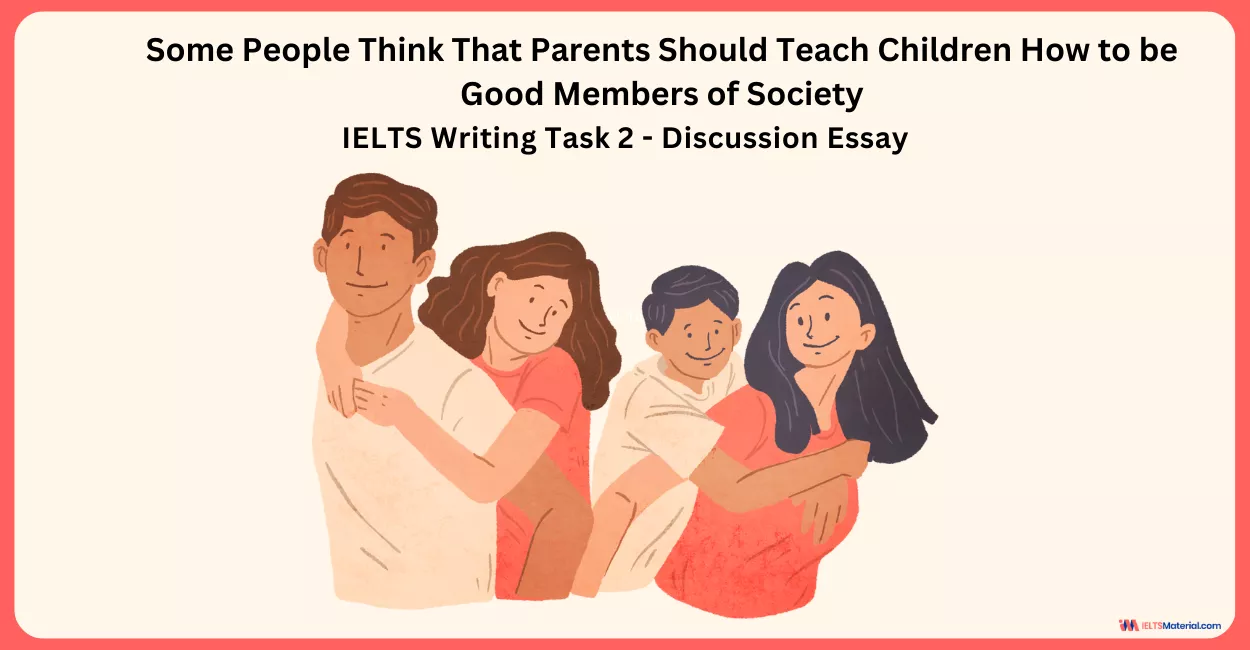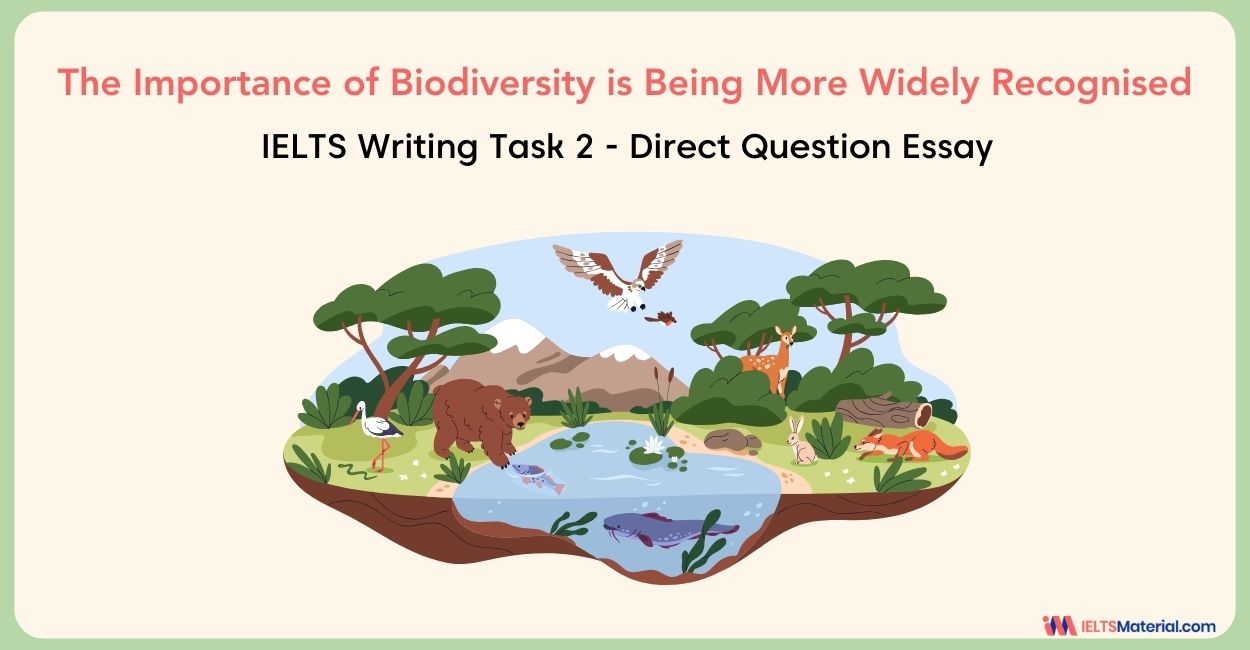The Importance of Biodiversity is Being More Widely Recognised – IELTS Writing Task 2
Looking to score high in IELTS Writing? Get access to Band 7-9 sample answers on "The Importance of Biodiversity is Being More Widely Recognised" and improve your essay writing skills!
Table of Contents

Try AI Essay Checker for Instant Band Score
The IELTS Writing Task 2 is a part of the General Training and Academic examinations that assess your ability to compose an organized and well-structured essay on a given topic. Direct Question Essays like ‘The Importance of Biodiversity is Being More Widely Recognised’, are part of Task 2 and so, you need to acquaint yourself with the purpose of the question and framework of the answer.
Usually, Direct Question essays have two questions and are also called Two Part Question essays. Unlike the classic type, the essay topic, The Importance of Biodiversity is Being More Widely Recognised, asks you one direct question and you need to understand the question and figure out what is being asked. Once deciphered, you need to make sure to answer the given question with clarity and support your ideas with appropriate examples.
A significant number of IELTS candidates encounter difficulties when it comes to the Essay Writing section of the IELTS Writing Module. If you feel you need to practise more essays to master this task, you can check out the IELTS Writing Task 2 Practice Tests.
Now, let’s have a look at the Direct Question essay – The Importance of Biodiversity is Being More Widely Recognised – with three sample answers.
Question
You should spend about 40 minutes on this task.
The importance of biodiversity is being more widely recognised as increasing numbers of species come under threat. What can be done to maintain biodiversity?
Give reasons and relevant examples for your answer.
You should write at least 250 words.
Outline
Type of Essay:
Structure Breakdown:
|
Get the edge on IELTS Writing Task 2 with our exclusive study material! Don’t miss out on this great deal!
Band 7 Sample Answer
Biodiversity, the variety of life on Earth, is important for the health and preservation of our planet. However, with the increasing threats to various species, the importance of maintaining biodiversity has become widely recognized. Various strategies that can be implemented to maintain and protect it will be discussed in the following paragraphs.
Despite its significance, biodiversity faces numerous threats, primarily driven by human activities. One of the primary ways to protect biodiversity is to preserve natural habitats. For example, the Amazon Rainforest in South America is critical for conserving diverse ecosystems. Secondly, raising awareness about the importance of biodiversity is necessary for gathering public support. Education programs, documentaries, and initiatives like Earth Day inform and inspire individuals to take action to save biodiversity.
In addition, involving local communities in conservation efforts is essential. Native people often have traditional knowledge about ways to manage resources efficiently. Therefore, including them in decision-making ensures that conservation efforts respect cultural diversity and are more effective. Lastly, governments can play a central role in biodiversity conservation by passing and applying laws that protect habitats and regulate activities that pose a threat to wildlife. For instance, the Endangered Species Act in the United States has been instrumental in guarding various species from destruction.
To conclude, maintaining biodiversity is a shared responsibility that requires united efforts at local, national, and global levels. Habitat conservation, education, legislation and community involvement ensure the survival of different species on our planet. By recognizing the fundamental value of biodiversity and taking meaningful actions, we can leave a vibrant Earth for future generations. (261 words)
Vocabulary
- Preservation (Noun)
Meaning: the activity of protecting something from loss or danger
E.g.: The mayor’s duty is the preservation of peace in the community.
- Implemented (Verb)
Meaning: to start using a plan or system
E.g.: The Principal implemented the rule against mobile phones yesterday.
- Habitats (Noun)
Meaning: the natural environment in which an animal or plant usually lives
E.g.: The natural habitats of plants and animals are being destroyed by urbanization.
- Critical (Adjective)
Meaning: of the greatest importance to the way things might happen
E.g.: His final decision is critical for the future of the company.
- Native (Adjective)
Meaning: belonging to a particular place by birth
E.g.: The native people of the island were thrown out of their own homes.
- Ensures (Verb)
Meaning: to make something certain to happen
E.g.: Biological parks and sanctuaries ensure the protection of endangered species.
- Diversity (Noun)
Meaning: condition of having or being composed of differing elements
E.g.: India is a perfect example of unity in diversity.
- Pose (Verb)
Meaning: present or constitute (a problem or danger)
E.g.: Deforestation poses a threat to destruction of forest ecosystems.
- Instrumental (Adjective)
Meaning: serving as a means of pursuing an aim or policy
E.g.: Mira is instrumental in spreading awareness about the changes in the company policies.
- Legislation (Noun)
Meaning: a law or set of laws suggested by a government and made official by a parliament
E.g.: The legislation in the country requires a huge change.
GET STARTED NOW with a FREE trial and chat with our experts!
Band 8 Sample Answer
In the face of mounting threats to biodiversity, the urgency to preserve Earth’s diverse life forms has become essential. Biodiversity, the variety of living organisms and ecosystems, is essential for the health of our planet and the well-being of its inhabitants. This essay explores effective strategies for maintaining biodiversity, supported by popular examples demonstrating their impact.
To begin with, establishing and maintaining protected areas and wildlife reserves is an integral part of biodiversity conservation. These areas provide safe shelters for a multitude of species. The Yellowstone National Park in the United States is a prime example, home to a wide range of flora and fauna, including the reintroduced gray wolves that have had tremendous positive effects on the entire ecosystem. Additionally, educating the public about the importance of biodiversity cultivates a sense of responsibility. The Monarch Butterfly Conservation Initiative in North America, which involves citizen scientists in monitoring and protecting monarch butterfly populations, shows the power of public action in conservation.
Moreover, pollinators, such as bees and butterflies, play a crucial role in maintaining biodiversity by aiding the reproduction of plants. To protect pollinators, initiatives like the “Bee Friendly Farming” program promote reducing pesticide use and creating pollinator-friendly farm habitats. Also, engaging local communities in biodiversity conservation is crucial. The Namibian conservancy model, where local communities actively participate in wildlife management and benefit from ecotourism, has led to the recovery of wildlife populations and habitats.
To sum up, maintaining biodiversity demands an all-round approach that combines habitat protection, awareness and community involvement. The examples highlighted demonstrate that scientific innovation and public participation make successful conservation efforts possible. By embracing these strategies, we can work towards a balanced coexistence with the varied life forms on Earth, ensuring a sustainable future for generations to come. (293 words)
Vocabulary
- Mounting (Adjective)
Meaning: gradually increasing
E.g.: The mounting taxation charges are negatively affecting the taxpayers.
- Inhabitants (Noun)
Meaning: one that occupies a particular place regularly, routinely, or for a period of time
E.g.: The inhabitants of the haunted house finally left the place.
- Integral (Adjective)
Meaning: necessary and important as a part of a whole
E.g.: Proper health management is an integral part of our lives.
- Reintroduced (Verb)
Meaning: to introduce (someone or something) again
E.g.: The committee reintroduced the ethnic day celebration in the office.
- Tremendous (Adjective)
Meaning: great in amount, size, or degree; extremely large
E.g.: The loss of his parents had a tremendous impact on the child’s mind.
- Pollinators (Noun)
Meaning: an animal that helps fertilize plants by moving pollen from one to another
E.g.: Pollinators are essential for the survival of flowering plants.
- Pesticide (Noun)
Meaning: a chemical substance used to kill harmful insects, small animals, wild plants, and other unwanted organisms
E.g.: The excessive use of pesticides has been banned in the country.
- Ecotourism (Noun)
Meaning: nature-based activities that increase visitor appreciation and understanding of natural and cultural values
E.g.: There are many positive effects of ecotourism on the environment and the global economy.
- Coexistence (Noun)
Meaning: the fact of living or existing together at the same time or in the same place
E.g.: The coexistence of the siblings was supported by their shared needs.
- Sustainable (Adjective)
Meaning: the ability to continue over a long period of time
E.g.: We should promote sustainable development for the environment.
Take advantage of our IELTS webinars NOW for expert insights and ace your exam with confidence!
Band 9 Sample Answer
Unlock Answer
One of the fundamental strategies for maintaining biodiversity is protecting and restoring natural habitats. Australia’s Great Barrier Reef Marine Park Authority has implemented strict measures to safeguard the world’s largest coral reef system, protecting diverse marine life and enhancing ecosystem stability. Simultaneously, adopting sustainable agricultural practices is vital for minimizing the impact of farming on biodiversity. Practical methods such as organic farming and agroforestry promote biodiversity while maintaining agricultural productivity. The “Bird Friendly” coffee certification, which encourages shade-grown coffee that preserves bird habitats, is an illustrative example.
Most importantly, biodiversity knows no borders, and global cooperation is vital. International agreements like the Convention on International Trade in Endangered Species of Wild Fauna and Flora (CITES) regulate the international trade of endangered species, helping prevent over-exploitation and illegal trafficking. Besides enlightening the public about the relevance of biodiversity, enacting and enforcing laws to protect biodiversity is a cornerstone of conservation. The Bald Eagle Protection Act in the United States played a pivotal role in recovering the bald eagle population, symbolizing the success of legal protections for threatened species.
On the whole, sustaining biodiversity requires a comprehensive and collaborative approach that addresses the complex interplay of ecological, social, and economic factors. The examples provided demonstrate that successful strategies involve a combination of habitat protection, sustainable practices, public awareness, policy implementation and global cooperation. By enforcing and adapting these strategies, we can strive to ensure the resilience and richness of Earth’s biodiversity for current and future generations. (303 words)
Vocabulary
- Intricate (Adjective)
Meaning: having a lot of small parts that are arranged in a complicated or delicate way
E.g.: The intricate work on the dress attracted everyone’s attention.
- Alarming (Adjective)
Meaning: worrying or disturbing
E.g.: His rude behavior in the party was quite alarming for his parents.
- Agroforestry (Noun)
Meaning: a land use management system in which combinations of trees or shrubs are grown around or among crops or pastureland
E.g.: Agroforestry is a positive step towards sustainable land management and conservation of environment.
- Illustrative (Adjective)
Meaning: helping to explain or prove something
E.g.: The conference provided some illustrative examples of the current management system in agriculture.
- Enlightening (Verb)
Meaning: giving you more information and understanding of something
E.g.: Participating in the seminar was quite enlightening for all of us.
- Cornerstone (Noun)
Meaning: an important quality or feature on which a particular thing depends or is based
E.g.: Honesty, hard work and discipline are the cornerstones of our institution.
- Pivotal (Adjective)
Meaning: central and important
E.g.: Jack’s action was pivotal in the decision-making process of the jury.
- Collaborative (Adjective)
Meaning: produced by or involving two or more parties working together
E.g.: The collaborative efforts of the school and the parents can improve the quality of a child’ development.
- Sustaining (Verb)
Meaning: strengthen or support physically or mentally
E.g.: After sustaining the blow to his head, the chances of his survival was reduced.
- Resilience (Noun)
Meaning: the ability to be happy, successful, etc. again after something difficult or bad has happened
E.g.: We were impressed by his resilience even after the recent losses he had to face.
IELTS Writing Task 2 Connectors for Gaining Bonus Points
Check out the list of connectors used in the above-given sample answers that will help you add coherence to your writing and earn points for your IELTS Writing Task 2.
- However
- Despite
- For example/For instance
- Secondly
- In addition
- Therefore
- Lastly
- To conclude
- To begin with
- Additionally
- Moreover
- Also
- To sum up
- Simultaneously
- Most importantly
- Besides
- On the whole
Now that you have gone through the sample answers on the topic – The Importance of Biodiversity is Being More Widely Recognised – it is time for you to try writing on your own. For that, leave your answers as a comment below or you can use our FREE evaluation service!
Additional Study Resources
- Can you use Quotes or Idioms in your IELTS Essay?
- How Would You Define Happiness- IELTS Writing 2
- IELTS Writing Masterclass Costly Mistakes | Avoid These Common Mistakes
- Culture is Turning Similar Around the World- IELTS Writing Task 2
- Best Ways to Improve your English Communication Skills | IELTSMaterial.com
- Leaders and directors in an organisation are normally older people – IELTS Writing Task 2 Argumentative Essays
- Coherence and Cohesion in IELTS Writing
- Traditional food is undergoing great changes – IELTS Writing Task 2
- 20 Best IELTS Preparation Books for Self Study 2023
Practice IELTS Writing Task 2 based on Essay types

Start Preparing for IELTS: Get Your 10-Day Study Plan Today!
Explore other IELTS Articles

Kasturika Samanta

Haniya Yashfeen
Recent Articles

Haniya Yashfeen


Prity Mallick

Kasturika Samanta






Post your Comments